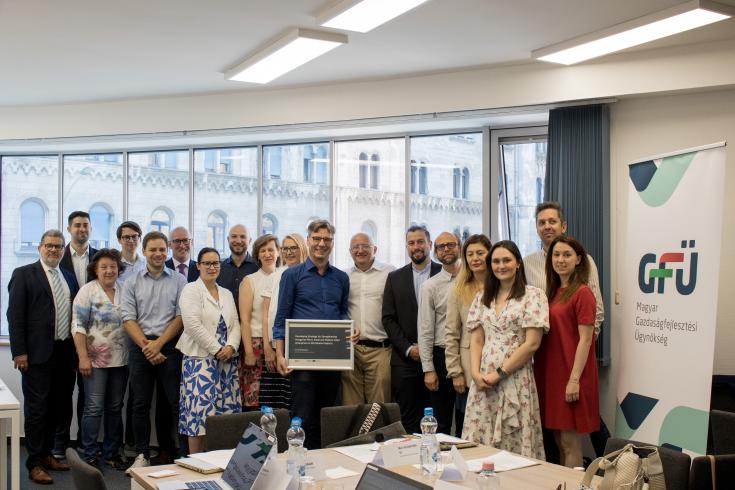Strengthening Hungarian Micro, Small and Medium-sized Enterprises in ESG Related Aspects

On 2-3 July 2024, the Policy Learning Platform held an onsite peer review for the Hungarian Economic Development Agency, which requested advice regarding their policy challenge on how to support SMEs in ESG related aspects.
Peers from across Europe
Peers from across Europe
Alongside René Tonisson, and Mart Veliste our Thematic Experts on ‘Smarter Europe’, six excellent peers participated in the peer review:
- De. Katharina Schoeps, RKW Sachsen GmbH, Germany,
- Tony Schuetze, RKW Saxony GmbH, Germany,
- Peter Friberg, Region Jönköping County, Sweden,
- Micael Ragnar, Region Jönköping County, Sweden,
- Maarika Taal, Estonian Ministry of Finance, Estonia,
- Dr. Mari Kooskora, Estonian Business School, Estonia
Some Recommendations
- There ought to be a structured way of doing policy as it enables to identify gaps. A key mechanism structure - Financial Incentives, Regulatory Support and Compliance Assistance, Capacity Building and Training, Market Access and Recognition; Public-Private Partnerships – should be tailored to the Hungarian context.
- ESG related trainings need to consider the stage and need of the SME. Companies have different level of knowledge and awareness (depending to which degree they need to comply with a customer’s requirement or national regulation). A cascade approach where trainings are tailored according to these different stages yields the best results. For companies that want to go further in the sustainability or ESG journey a tailored, company-specific approach is most suited for identifying where the biggest impact lies. A voucher scheme for expert consulting could used to provide such tailored assistance.
- At the same time, the trainings should also differentiate between the participants. Different support formats ought to be offered to executives, sustainability managers, communication personnel and board members of SMEs. The latter target group is especially important as when there is no real managerial support then the results are limited. Without emphasis on „Governance“ the overall ESG activities are not sustainable.
- Benefits can be reaped by implementing a quadruple helix approach. Academia, the third-sector, and business sector (representative organizations) are also in parallel tackling aspects of ESG. An informal roundtable format with these stakeholders enables to find synergies across initiatives and to learn from each other to further develop programmes and policies.
- Funding programmes ought to be simple. Small incentives / door-opener programmes can go a long way to encourage SMEs to take first steps in their ESG journey. Such programmes also help nudge the sector as a while by promoting good practices and success stories. To increase attendance in the support programmes, incentives such as increased funding rates or higher ranking in other support programmes could be offered. At the same time, some co-financing by the companies, i.e. having their own skin in the game, is equally important for real change.
More information about the recommendations will be published shortly in the follow-up report.
Image

Peer review publication
Find more information on the methodology and experiences of previous beneficiaries in our publication.
Image

Apply for a peer review
Start your peer review application process today and find solutions to your policy challenge with our expert and peers!
Hungarian Economic Development Agency - peer review - follow-up report.pdf
Download
(669.19 KB)
/sites/default/files/2024-08/2024-08-26%20Hungarian%20Economic%20Development%20Agency%20-%20peer%20review%20-%20follow-up%20report.pdf